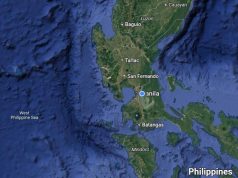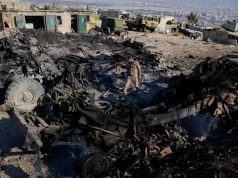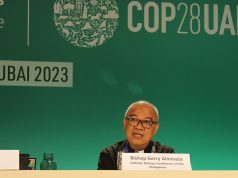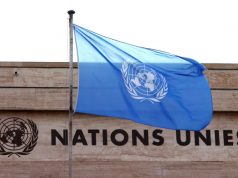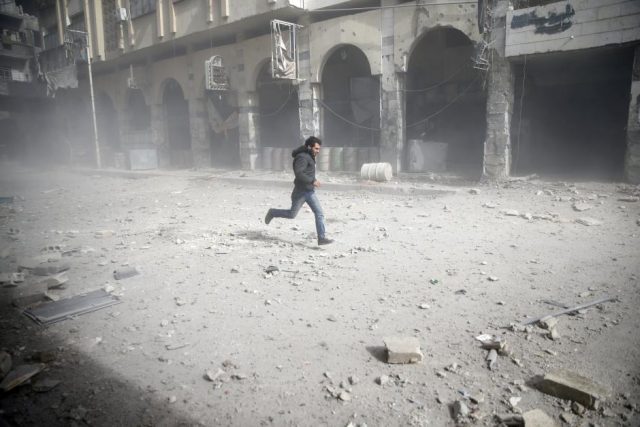
BEIRUT — The United Nations called on Tuesday for an immediate humanitarian ceasefire in Syria of at least a month, as heavy air strikes were reported to have killed scores of people in the last major rebel stronghold near Damascus.
Separately, U.N. war crimes experts said they were investigating several reports of bombs allegedly containing chlorine gas being used against civilians in the rebel-held towns of Saraqeb in the northwestern province of Idlib and Douma in the Eastern Ghouta suburbs of Damascus.
The Syrian government denies using chemical weapons.
The Syrian Observatory for Human Rights said Tuesday’s bombardment of Eastern Ghouta had killed 63 people. A local official, Khalil Aybour, put the toll at 53.
On Monday, air strikes killed 30 people in Eastern Ghouta, the Observatory said.
“Today there is no safe area at all. This is a key point people should know: there is no safe space,” Siraj Mahmoud, the head of the Civil Defence rescue service in opposition-held rural Damascus, told Reuters.
“Right now, we have people under rubble, the targeting is ongoing, warplanes on residential neighborhoods.”
Insurgent shelling of government-held Damascus killed three people, the Observatory and Syrian state media reported.
Air strikes also killed at least six people in rebel-held Idlib including five in Tarmala village, the Observatory said.
U.N. officials in Syria called for fighting to stop to enable aid deliveries and the evacuation of sick and wounded, listing seven areas of concern including northern Syria’s Kurdish-led Afrin region, being targeted by a Turkish offensive.
“For the last two months we have not had a single (aid-delivery) convoy. This is really outrageous,” said Panos Moumtzis, assistant U.N. secretary general and regional humanitarian coordinator for the Syria Crisis.
Syrian President Bashar al-Assad, helped by Iranian-backed militias and the Russian air force, is pursuing military campaigns against insurgents in the last major pockets of territory held by his opponents in western Syria.
Ghouta and Idlib
There were air raids on towns across Eastern Ghouta including Douma, where an entire building fell, a witness said.
The U.N. representatives noted that Eastern Ghouta had not received inter-agency aid since November.
“Meanwhile, fighting and retaliatory shelling from all parties are impacting civilians in this region and Damascus, causing scores of deaths and injuries,” said their statement, released before the latest casualty tolls emerged on Tuesday.
They said civilians in Idlib were being forced to move repeatedly to escape fighting, noting that two pro-government villages in Idlib also continued to be besieged by rebels.
Some two million people now live in Idlib, one million of whom have already been displaced. Since the most recent Syrian army offensive began in mid December, 300,000 people have been displaced within Idlib, said Moumtzis.
“We’re running out of solutions where we put these people.”
Syria’s protracted war, which spiraled out of street protests against Assad’s rule in 2011, will soon enter its eighth year, having killed hundreds of thousands of people and forced millions to leave the country as refugees.
Paulo Pinheiro, head of the International Commission of Inquiry on Syria, said the government siege of Eastern Ghouta featured “the international crimes of indiscriminate bombardment and deliberate starvation of the civilian population”.
Reports of air strikes hitting at least three hospitals in the past 48 hours ”make a mockery of so-called “de-escalation zones”, Pinheiro said, referring to a Russian-led truce deal for rebel-held territory, which has failed to stop fighting there.
“There is a misperception that the de-escalation areas have resulted in peace and stability… if anything, these have been serious escalation areas,” said Moumtzis.
France’s Foreign Ministry said it was concerned by the reports of chlorine used on civilians in Syria, but it was too soon to confirm them. French President Emmanuel Macron said last May that “any use of chemical weapons would result in reprisals and an immediate riposte, at least where France is concerned”.
The conflict has been further complicated since January by a an offensive that neighboring Turkey launched against the Kurdish YPG militia in Afrin.
‘U.S. calculations’
The YPG has been an important U.S. ally in the war against Islamic State militants, but Ankara sees it as an extension of the Kurdistan Workers Party (PKK), which is listed as a terrorist group by Turkey, the European Union and Washington.
Turkish President Tayyip Erdogan ramped up his verbal assault on the U.S. role in Syria on Tuesday, saying U.S. forces should leave Manbij, a Syrian city held by YPG-allied forces with support from a U.S.-led anti-Islamic State coalition.
“If the United States says it is sending 5,000 trucks and 2,000 cargo planes of weapons for the fight against Daesh (Islamic State), we don’t believe this,” Erdogan said.
“It means you have calculations against Turkey and Iran, and maybe Russia.”
In accord with Iran and Russia, Turkey’s military is setting up observation posts in parts of Idlib and Aleppo province.
But militants firing rockets and mortars killed one soldier on Monday as Turkish forces moved to set up such a post south of Aleppo, near the front line between rebels and pro-Syrian government forces, the military said.
It was the second attack on the soldiers in a week.
In an apparent warning to Ankara, a commander in the military alliance supporting Assad said the Syrian army had deployed new air defenses and anti-aircraft missiles to front lines with rebels in the Aleppo and Idlib areas.
“They cover the air space of the Syrian north,” the commander told Reuters. That would include the Afrin area where Turkish warplanes have been supporting the ground offensive by the Turkish army and allied Free Syrian Army factions.




